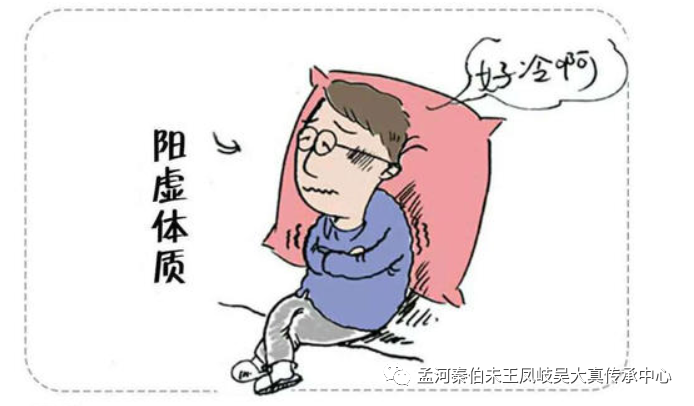In Traditional Chinese Medicine (TCM), individuals with a weak constitution can be categorized into Yin deficiency and Yang deficiency. What is Yang deficiency? What are its symptoms? Yang deficiency refers to the deficiency of Yang Qi in the human body. This is a pathological manifestation caused by the decline and weakening of bodily functions, leading to insufficient Yang heat due to low metabolic function. Yang Qi plays a role in warming the limbs and organs; if Yang Qi is deficient, bodily functions decline, and signs of coldness are easily observed. Common clinical manifestations include Stomach Yang deficiency, Spleen Yang deficiency, and Kidney Yang deficiency.
 1 Main Manifestations of Yang Deficiency
1 Main Manifestations of Yang Deficiency

The main manifestations of Yang deficiency include aversion to cold and cold limbs, lack of energy, pale complexion, loose stools, undigested food, clear and frequent urination, a pale and swollen tongue, and a weak and deep pulse. A key point for diagnosis is that individuals with Yang deficiency are particularly sensitive to cold, especially in the back and abdomen. Clinically, it can be categorized into Stomach Yang deficiency, Kidney Yang deficiency, and Spleen Yang deficiency, with patients commonly exhibiting the following five symptoms.
1. Pale complexion and lack of energy. Most individuals with Yang deficiency will present with a pale complexion, as Yang deficiency leads to Qi and blood deficiency, impairing blood circulation and resulting in a poor complexion. Additionally, insufficient Yang Qi can weaken cellular vitality, causing overall fatigue and lack of spirit.
2. Cold intolerance. Individuals with Yang deficiency may also experience Qi deficiency and Qi stagnation, leading to weakened heart contractions and poor blood circulation to the extremities, resulting in cold limbs and sometimes a strong aversion to cold. In severe cases, this may lead to varicose veins in the lower limbs, requiring caution.
3. Undigested food. The term “undigested food” refers to stools containing food that has not been fully digested. This condition is primarily caused by Spleen Yang deficiency, which weakens gastrointestinal function, making it difficult for food to be digested and absorbed properly, or causing it to be expelled before digestion is complete.
4. Pale and swollen tongue with tooth marks. The vaporization of Yang Qi affects the metabolism and consumption of water within the body. When Yang Qi is sufficient, the body does not exhibit abnormalities. However, in cases of Yang deficiency, water cannot be adequately metabolized and is retained, leading to a swollen tongue; the tongue may also show clear tooth marks due to pressure from the teeth.
5. Weak pulse. Yang deficiency is a term used in TCM, and when patients consult a TCM practitioner, the doctor will perform a pulse diagnosis. If the pulse is found to be excessively weak and fine, it may indicate that Yang deficiency has weakened the heart’s contraction force, resulting in insufficient blood flow to effectively pulse the arteries.
 2 Treatment of Yang Deficiency in TCM
2 Treatment of Yang Deficiency in TCM

Yang deficiency is characterized by insufficient Yang Qi and weakened warming functions. The main treatment methods in TCM for Yang deficiency include herbal therapy, acupuncture, and tui na (Chinese therapeutic massage). Since Yang deficiency can occur in the heart, liver, spleen, lungs, kidneys, etc., treatment should be tailored to the specific symptoms presented by the patient for optimal effectiveness.
1. Herbal therapy: For symptoms of Yang deficiency, oral administration of Chinese herbal medicine can be used under the guidance of a qualified physician. Commonly used formulas include Bao Yuan Tang (Preserving Original Decoction), Fu Zi Li Zhong Wan (Aconite Decoction for Regulating the Middle), and You Gui Wan (Restorative Kidney Pill). Additionally, after diagnosis, the physician may prescribe decoctions or recommend herbs such as Ren Shen (Ginseng), Huang Qi (Astragalus), Bai Zhu (White Atractylodes), Gan Jiang (Dried Ginger), Shu Di (Rehmannia), and Shan Zhu Yu (Cornus) to alleviate Yang deficiency symptoms.
2. Acupuncture: By stimulating specific acupuncture points, the balance of Yin and Yang and the flow of meridians can be adjusted, alleviating the patient’s condition.
3. Tui na: This method involves applying external force to the meridians to promote the circulation of Qi and blood, effectively improving Yang deficiency symptoms.
 3 Daily Care for Yang Deficiency
3 Daily Care for Yang Deficiency

Patients with Yang deficiency should pay attention to keeping warm, avoiding prolonged exposure to cold and damp environments, and refrain from working in water for extended periods. They should also ensure adequate rest, avoid excessive fatigue, and maintain a balanced diet, consuming easily digestible foods. It is important to drink plenty of water and engage in regular exercise, ensuring that movements are gentle and avoiding intense workouts, as these practices can help improve Yang deficiency symptoms.
1. Dietary therapy: Develop good eating habits with regular meals and a diverse diet. It is advisable to consume more warming foods, such as lamb, dog meat, scallions, ginger, garlic, pepper, and fennel, and to include dishes like Dang Gui Sheng Jiang Yang Rou Tang (Angelica and Ginger Lamb Soup) and Ai Cao Zhu Ji Dan (Mugwort Boiled Egg). Cold and cooling foods should be avoided.
2. Regular lifestyle and appropriate exercise: A regular lifestyle is essential for health, and maintaining good sleep is also crucial. Sufficient sleep benefits the generation of Qi and blood and replenishes kidney essence. Actively participating in physical exercise can enhance kidney function. Engaging in aerobic exercises such as running, Tai Chi, yoga, sword dancing, and Ba Duan Jin can promote blood circulation, harmonize the organs’ Qi and blood, balance Yin and Yang, stimulate internal Yang Qi, and strengthen the body.
3. Avoid excessive fatigue: Do not overexert yourself, maintain a cheerful disposition, relax your mindset, and reduce negative emotions. Mental health greatly contributes to physical health and is beneficial for the kidneys.
4. Non-pharmacological therapies such as moxibustion and cupping: These methods involve warming and stimulating specific acupuncture points to invigorate internal Yang Qi, which can help improve Yang deficiency. For example, moxibustion can be applied to points such as Zu San Li (Stomach 36), Ming Men (Gate of Life), Shen Yu (Kidney Shu), Guan Yuan (Conception Vessel 4), and Shen Que (Conception Vessel 8).
As stated in the “Huang Di Nei Jing” (Yellow Emperor’s Classic of Internal Medicine), “The kidney Qi emerges from the Yong Quan (Kidney 1), which is located at the sole of the foot.” This means that the Qi of the kidney meridian, like spring water, originates from the feet and nourishes the entire body. Therefore, the Yong Quan point is very important for health maintenance, disease prevention, and treatment. Regular foot baths or massages at the Yong Quan point before bed can help nourish the kidneys and stabilize essence.


